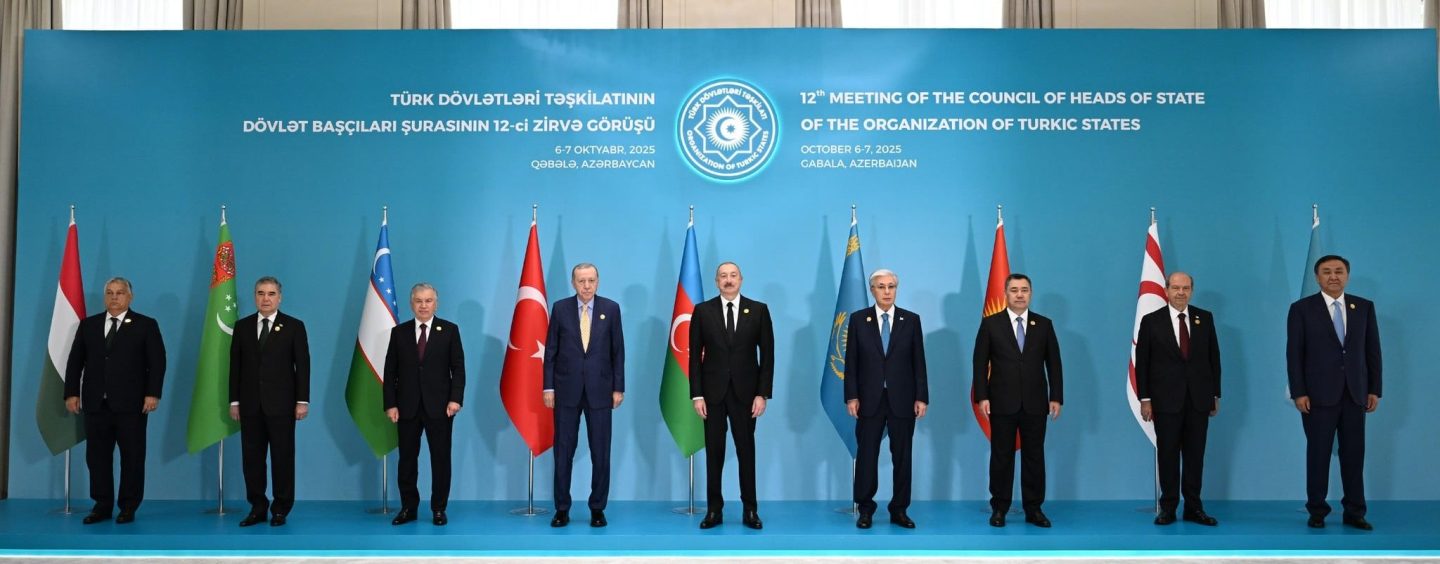By Laman Zeynalova – Trend News Agency
12th Summit of the Council of Heads of State of the Organization of Turkic States (OTS), held in Gabala, Azerbaijan, highlighted the growing importance of the organization on the regional stage and underscored Azerbaijan’s strategic role in realizing the potential of its member states. A central theme of the summit was strengthening transport and energy networks, with Azerbaijan serving as a key hub, turning ‘Turkic World’ initiatives into projects of international scale.
Transport: Azerbaijan as a bridge between East and West
At the summit, President Ilham Aliyev emphasized Azerbaijan’s active role in the East-West and North-South transport corridors.
“Azerbaijan is an active player in the East-West and North-South transport corridors, serving as a vital bridge between Türkiye and Central Asia across geographic, economic, transport, and other domains. Since 2022, cargo traffic through the Middle Corridor has increased by approximately 90%. Transit time along the route has significantly decreased. Assets such as the Caspian Sea’s largest trade fleet, the International Trade Port of Alat, which is expected to reach a capacity of 25 million tons per year in the coming years, the Baku-Tbilisi-Kars railway, 9 international airports, the region’s largest cargo airline, and other factors have contributed to establishing Azerbaijan as a major international transport hub,” the head of state pointed out.
Other OTS leaders also stressed the importance of integrated transport infrastructure. Uzbekistan’s President Shavkat Mirziyoyev noted that linking the Middle Corridor with the China-Kyrgyzstan-Uzbekistan railway and the proposed Trans-Afghan corridor will create a strategic, multi-sector network that promotes business development and reduces transit costs.
OTS Secretary-General Kubanychbek Omuraliev added that the strategic significance of the Middle Corridor will further increase once the China-Kyrgyzstan-Uzbekistan railway is operational. He also highlighted that opening the Zangazur corridor, a key part of the Middle Corridor, will strengthen the Turkic World geopolitically and create new economic and transit opportunities.
In today’s context, the Middle Corridor is not just an alternative route – it is a critical transport and logistics artery for Eurasia. Recent geopolitical shifts have shown the vulnerability of global trade, making the Middle Corridor an increasingly reliable and secure route connecting East and West through Central Asia and the Caucasus, while maintaining stable links to Europe.
Energy: from reliable exporter to renewable energy hub
Energy security was another key focus of the summit. President Ilham Aliyev highlighted Azerbaijan’s strategic role in connecting the Caspian region to international markets through a diversified network of oil and gas pipelines. “At present, Azerbaijan exports natural gas to 14 countries. In terms of geographic coverage, Azerbaijan ranks first among nations exporting natural gas via pipeline”.
President Ilham Aliyev further highlighted the country’s investments in renewable energy, including solar, wind, and hydro power. “By 2030, approximately 40% of our energy production is expected to come from renewables. Currently, we are developing a green energy corridor connecting Central Asia, Azerbaijan, Türkiye, and Europe”.
Azerbaijan continues to strengthen its position in the European energy market as a reliable, predictable, and long-term partner. Amid global instability and the push to diversify energy supplies, European countries increasingly turn to Azerbaijan for stable and mutually beneficial energy deliveries.
The country has demonstrated its commitment to energy solidarity by expanding export routes, modernizing infrastructure, and increasing supply volumes. Strengthening energy dialogue with Europe at both bilateral and multilateral levels contributes to building a collective energy security framework.
Azerbaijan is also prioritizing a green economy, actively partnering with international stakeholders on renewable energy projects. Large-scale initiatives in solar and wind power, implemented with companies such as Masdar and ACWA Power, as well as infrastructure projects supported by international financial institutions like the AIIB and ADB, highlight the country’s commitment to sustainable development and global climate action.
This balanced approach – combining traditional energy with green transformation – positions Azerbaijan as a key player on Eurasia’s energy map and a vital part of Europe’s current and future energy system.
During the OTS summit, leaders highlighted Azerbaijan’s role in regional energy security. Hungarian Prime Minister Viktor Orbán thanked President Ilham Aliyev for allowing Hungarian energy companies to participate in major gas and oil projects in Azerbaijan and Europe, noting the strategic significance for Hungary in the global energy market.
In the renewable energy sector, initiatives such as the Advanced Energy Efficiency Council within the OTS, proposed by Kazakh President Kassym-Jomart Tokayev, demonstrate the Turkic states’ commitment to jointly developing infrastructure and energy projects, including the Green Energy Corridor.
Azerbaijan as a regional integration hub
From a regional integration perspective, Azerbaijan is emerging as a central node for transport and energy flows in the ‘Turkic World’. The development of the Middle Corridor and Zangazur route, diversification of oil and gas exports, investments in renewable energy, and the establishment of a Green Energy Corridor all lay the foundation for sustainable economic growth, strengthen Azerbaijan’s role as an international partner, and enhance OTS influence globally.
Azerbaijan’s transport and energy strategy extends beyond national interests, positioning the country as a strategic bridge between East and West and a key hub for ‘Turkic World’ integration.






